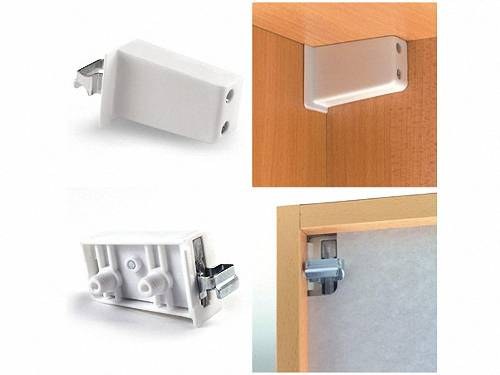Hanging kitchen cabinets designed for storage of various small kitchen utensils products, kitchen appliances. Of course, the installation of these items of kitchen units, special attention should be paid to the quality and reliability of the sample.
The most common type of installation of kitchen Cabinet on the wall is hanging it on the screws, screwed into the spacer (some call them razgonnyj) dowels of the appropriate size. In hardware stores screws with dowels are usually sold in pairs. Stop your choice on the screw 8 to 80, preferably galvanized. This size would be sufficient for secure mounting of the Cabinet on the wall.
It is possible to use instead of a screw hook threaded for screwing it into the dowel. Many find this method even more convenient, because you do not have to choose the size of Cabinet hinges-size of screw head.
Easy and convenient to make the procedure of attaching of the furniture, using mounting a curtain rail and adjustable curtains. If you intend to place hardly a few cabinets, and want to achieve maximum alignment between them and overlap in the horizontal and vertical planes, there is no better option than to use these things, you will not find.
This method allows you to hang the furniture in the kitchen if the walls are not are characterized by perfect evenness, or observed differential vertical due to the fact that tiles are laid only a kitchen apron and above the regular wall tiles. This kind of problem can be solved using conventional wooden slats with a thickness close to the thickness of the tile and a width of 40-50 mm.
Almost outdated view of mounting rack on the wall is hanging it on the screws, screwed into wooden chopiki. Wood tends to crack over time and the reliability of such fastening will be sooner or later broken.
1. Provide yourself the necessary tools. If the brick is quite a simple drill, the concrete easier to work with a drill having the function of a hammer (or impact drill). The drill must also fit the situation (drill bits for concrete, drill with pobeditovym a tip for the brick).
2. Size of fasteners (dowels, screws) – entirely your choice, but make the hole in the wall the size of a fist is also unwise.Will be the most optimal screw 8*80 In a brick wall, it is possible to use longer mounting (10*120).
3. If you drill a hole in a brick wall, note the thickness of the layer of plaster (sometimes he's quite impressive). Remember that the dowel needs to enter the brick and not plaster, not less than 5-6 cm
4. Try not to hang kitchen cupboards on plasterboard walls. With all the design precautions are unlikely to be reliable enough.
Do not overload your hitch furniture. Everything should be in moderation!
Principal fixings kitchen cabinets
The most common type of installation of kitchen Cabinet on the wall is hanging it on the screws, screwed into the spacer (some call them razgonnyj) dowels of the appropriate size. In hardware stores screws with dowels are usually sold in pairs. Stop your choice on the screw 8 to 80, preferably galvanized. This size would be sufficient for secure mounting of the Cabinet on the wall.
It is possible to use instead of a screw hook threaded for screwing it into the dowel. Many find this method even more convenient, because you do not have to choose the size of Cabinet hinges-size of screw head.
Easy and convenient to make the procedure of attaching of the furniture, using mounting a curtain rail and adjustable curtains. If you intend to place hardly a few cabinets, and want to achieve maximum alignment between them and overlap in the horizontal and vertical planes, there is no better option than to use these things, you will not find.
This method allows you to hang the furniture in the kitchen if the walls are not are characterized by perfect evenness, or observed differential vertical due to the fact that tiles are laid only a kitchen apron and above the regular wall tiles. This kind of problem can be solved using conventional wooden slats with a thickness close to the thickness of the tile and a width of 40-50 mm.
Almost outdated view of mounting rack on the wall is hanging it on the screws, screwed into wooden chopiki. Wood tends to crack over time and the reliability of such fastening will be sooner or later broken.
Practical tips
1. Provide yourself the necessary tools. If the brick is quite a simple drill, the concrete easier to work with a drill having the function of a hammer (or impact drill). The drill must also fit the situation (drill bits for concrete, drill with pobeditovym a tip for the brick).
2. Size of fasteners (dowels, screws) – entirely your choice, but make the hole in the wall the size of a fist is also unwise.Will be the most optimal screw 8*80 In a brick wall, it is possible to use longer mounting (10*120).
3. If you drill a hole in a brick wall, note the thickness of the layer of plaster (sometimes he's quite impressive). Remember that the dowel needs to enter the brick and not plaster, not less than 5-6 cm
4. Try not to hang kitchen cupboards on plasterboard walls. With all the design precautions are unlikely to be reliable enough.
Do not overload your hitch furniture. Everything should be in moderation!
